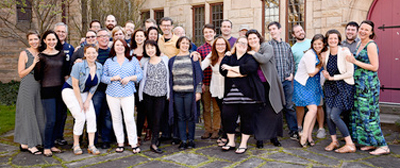by Daniel Hathaway

Styles ranged from the rough-edged vitality of colonial composer William Billings and the exploratory music of Charles Ives to the more sophisticated 20th-century music of Randall Thompson, Aaron Copland, and Samuel Barber. Popular music by Stephen Foster, folksong settings, and spirituals rounded out the program — with a little detour into a piece of spoken music by John Cage.
The men of the choir were already in place singing the opening of Billings’ round When Jesus wept as the women entered down the side aisle, joining in the texture as the men provided a drone underneath. This led seamlessly into a cheerful performance of Billings’ Shiloh, better known as the Christmas anthem “Methinks I see the heavenly host.”
MacPherson enjoys talking to his audiences, but the shift from a lofty, neo-Gothic nave to a more intimate, amphitheater-like space inspired him to maintain a particularly chatty relationship with the full house crowd at John Knox throughout the program. Frequent references to the World Series — game three was in progress that evening — and additions to the printed program notes drew the listeners in.
Before Ives’s setting of The Sixty-Seventh Psalm, MacPherson had the choir demonstrate what made the piece special: it’s written in two keys at once. First, the men sang their four-part music, written in G minor. Then, the women sang their parts in C major. What sounded conventional when taken apart became exotic when men and women sang together. The two tonally warring sections of the ensemble expertly stood their respective ground during the piece, weaving their unsettled harmonies into a strange, new tapestry.
Everybody who’s sung in a good choir has encountered Randall Thompson’s Alleluia, written to be performed by an international gathering of Fellows at the opening of the Berkshire Music Center at Tanglewood in 1940. Its two-word text (“Alleluia, Amen”) was chosen to obviate language challenges, but the character of the piece was determined by historical circumstances of World War II. Thompson called it “a sad fanfare for the fall of France,” and MacPherson noted that he intended to respect its slow tempo marking — often ignored — to point that out.
In practice, the tempo wasn’t quite as slow as Thompson was known to have taken the piece, but the Cleveland Chamber Choir gave the work a thoughtful, finely tuned, and beautifully balanced performance. When the time came for the accelerando, the mood became decidedly upbeat.
Veterans of really good college choruses may also have sung Aaron Copland’s Lark and Samuel Barber’s Reincarnations during their undergraduate careers. Lark is full of traps, both rhythmic and intonational, but MacPherson and his singers navigated them with ease. Joel Kincannon was the fine baritone soloist.
The Barber trilogy, on poems reworked from the Gaelic by James Stevens, also presents an array of choral challenges. CCC made lyrical gems out of the two love songs (“Mary Hynes” and “The Coolin”), and a moving lament out of “Anthony O’Daly” — after whose martyrdom, as the song says, “the stars do not shine,” and “there is nothing but grief!”
After intermission, MacPherson joined Jenna Hall Tucker, Natalie Mallis, and Corey Fowler in a palate-cleansing performance of John Cage’s “Story.” The quartet mock-seriously spoke Gertrude Stein’s words from Living Room Music, “Once upon a time the world was round and you could go on it around and around.”
Stephen Foster’s Hard Times Come Again No More and Nelly Bly moved the clock back to the mid-19th century for parlor songs arranged by Mark Keller and Jack Halloran. The Shaker tune More Love, in a juicy arrangement by Kevin Foster (no relation), featured soprano Kiko Weinroth. The late Stephen Paulus’s The Road Home set faux-folk poetry by Michael Dennis Browne in a diatonic, close-harmony style. The choir sang them deliciously.
The concert closed with two spirituals — one solemn, one rousing — both arranged by Moses Hogan, the late, great choral director and arranger who trained only a few miles down the road at Oberlin. There’s a Man Goin’ ‘Round, a personification of Death, was followed by Walk Together Children, an inspiring message that provided Cleveland Chamber Choir with a bravura ending to yet another splendid concert.
Published on ClevelandClassical.com November 14, 2016.
Click here for a printable copy of this article


